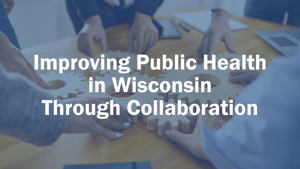Healing the Healers: Wisconsin's Initiative to Address Healthcare Workforce Burnout
August 4, 2025 Posted by AHW Endowment

Health professionals dedicate their lives to caring for others, but what happens when the healers themselves need healing? Across Wisconsin, and throughout the U.S., health workers are facing unprecedented levels of burnout, mental health challenges, and professional exhaustion that threaten both their well-being and the quality of patient care they provide.
 In a recent episode of the Advancing a Healthier Wisconsin Endowment's (AHW's) monthly livestream, Coffee Conversations with Scientists, Michael Stadler, MD, Associate Professor in the Department of Otolaryngology at the Medical College of Wisconsin and champion of the Advancing a Healthier Wisconsin Endowment's (AHW) Health Workforce Well-Being Landmark Initiative, discussed the critical state of health worker mental health and Wisconsin's groundbreaking response to this crisis.
In a recent episode of the Advancing a Healthier Wisconsin Endowment's (AHW's) monthly livestream, Coffee Conversations with Scientists, Michael Stadler, MD, Associate Professor in the Department of Otolaryngology at the Medical College of Wisconsin and champion of the Advancing a Healthier Wisconsin Endowment's (AHW) Health Workforce Well-Being Landmark Initiative, discussed the critical state of health worker mental health and Wisconsin's groundbreaking response to this crisis.
Understanding the Widespread Nature of Health Worker Burnout
Dr. Stadler's leadership of this initiative stems from his recognition that burnout affects health professionals at all levels. Through his own experiences and conversations with colleagues, he discovered how common these challenges have become. "As I engaged with my colleagues and peers, I realized how much of this was pervasive throughout all of their lives as well, at different time points and to different degrees, but that it was there," he explained.
The Scope of Wisconsin's Health Workforce Crisis
The problem of health worker burnout extends far beyond individual experiences. Dr. Stadler cited survey data that shows professional burnout rates "ranging anywhere from 10 to 30% in professional cohorts, and certainly much higher in rates of 50 to 60, 70% in various specialty subspecialties and cohorts of our workforce."
Wisconsin is one of only three states in the nation without a comprehensive professional health program for healthcare workers—a gap that has left many professionals without adequate support systems when they need help most.
The consequences of this crisis go far beyond individual suffering. "When we know that our health workforce is not whole, we know we cannot provide the best care to our patients and our communities," Dr. Stadler emphasized, highlighting the direct connection between clinician well-being and patient safety.
An Investment in Wisconsin's Healthcare Future
Recognizing the urgent need for systemic change, AHW announced in 2024 a commitment of $10 million to address health workforce well-being across the state through the Health Workforce Well-Being Landmark Initiative. Dr. Stadler leads the initiative with the goal, "to make Wisconsin the best place to work for our health workforce."
The initiative includes two major investments:
Wisconsin Healthcare Professional Services Program
A $2.5 million partnership with the Wisconsin Medical Society will establish the Wisconsin Healthcare Professional Services Program, providing confidential assessment, referral, treatment, and monitoring services for licensed healthcare professionals and trainees who may be at risk of impairment from mental and behavioral health challenges, substance use disorders, or other conditions.
This program aims to eventually serve every licensed healthcare professional in Wisconsin, including physicians, nurses, pharmacists, and dentists, and potentially extend to non-licensed professionals such as first responders.
Statewide Coalition for Sustainable Change
A nearly $3 million investment will fund a partnership with the Wisconsin Hospital Association and the Dr. Lorna Breen Heroes Foundation to build a collaborative coalition of Wisconsin's 30-plus health systems. This coalition will develop long-term, sustainable professional well-being improvement plans focused on the state's healthcare workforce.
The Dr. Lorna Breen Heroes Foundation, named after an emergency medicine physician who died by suicide during the COVID-19 pandemic, brings proven expertise from successful programs in Virginia, North Carolina, and Michigan to Wisconsin's unique healthcare landscape.
Why This Initiative is Different
The statewide effort represents the largest investment ever made in Wisconsin's health workforce well-being. "The sheer scale of this effort being statewide is unique in its own right," Dr. Stadler noted. "There's never been an investment in our healthcare workforce to this magnitude with this mission."
The initiative brings together leaders from all areas of health."Anyone and everyone, whether it's the CFO at a health system, the public health worker just trying to keep things afloat in their local health department, everyone in between—this resonates and this matters to them," Dr. Stadler explained.
Breaking Through Healthcare's Biggest Obstacles
Changing healthcare systems requires addressing several structural challenges. Dr. Stadler identified key areas that need attention, including the independence of healthcare organizations, budget realities that prioritize immediate needs, and a workplace culture where healthcare professionals are expected to be self-reliant.
"There is a culture in medicine and healthcare that teaches us in many ways that we need to be superhuman… That raising your hand and asking for help is a weakness," Dr. Stadler observed. Breaking down these cultural barriers requires ongoing dialogue and leadership commitment at all levels.
Help Available Today for Struggling Health Workers
While the new initiatives are launching, health workers experiencing burnout can access existing resources, including employee assistance programs, peer support programs, and professional society resources.
Dr. Stadler emphasized the importance of starting with local resources and expanding outward: "I would encourage folks to start with your local resources and then expanding beyond that… Whether it's your own individual society, Wisconsin Nursing Association, the Wisconsin Medical Society, Pharmacy Society of Wisconsin, they have either links or local information, or local programs that could help address some of these challenges."
Progress Already Taking Shape
Despite the challenges, Dr. Stadler sees reasons for optimism. Peer support programs are expanding across healthcare systems, more healthcare workers are staying in their jobs and new hires are increasing, and there's a growing awareness among healthcare leaders about the importance of workforce well-being.
One bright spot is the changes happening in medical education. "I've been fortunate enough to educate some of our first-year medical students this past year, and there is a course called 'The Good Doctor' that touched on so many of these topics," Dr. Stadler shared. "I have hope for that."
A Call to Action
The success of the initiative will require participation from all stakeholders in the health ecosystem. Dr. Stadler's message to health professionals, administrators, and policymakers is clear: "Lean in. Stay interested, stay engaged, lean in, ask tough questions, collectively hold us accountable for this work, and stay tuned. This is just the beginning."
As Wisconsin launches this ambitious journey to transform health workforce well-being, the potential impact extends far beyond state borders. Success here could serve as a model for other states navigating similar challenges, ultimately improving healthcare quality and accessibility for patients while ensuring that those who dedicate their lives to healing others receive the support they need and deserve.
"Our people here in this state are what make our healthcare so great," Dr. Stadler concluded. "We have great people, but those great people—there's a lot of them that are suffering. We need to help those folks so that we can help all of our folks in Wisconsin."
Learn More About Health Workforce Well-Being
To hear more from Dr. Stadler about Wisconsin's groundbreaking approach to health workforce well-being and the science behind supporting those who care for our communities, watch the full episode of Coffee Conversations with Scientists.
Click to learn more about the AHW Health Workforce Well-Being Landmark Initiative.

-1.png?width=300&name=Funding%20Announcement%20(2)-1.png)
-1.png?width=300&name=Untitled%20design%20(37)-1.png)
